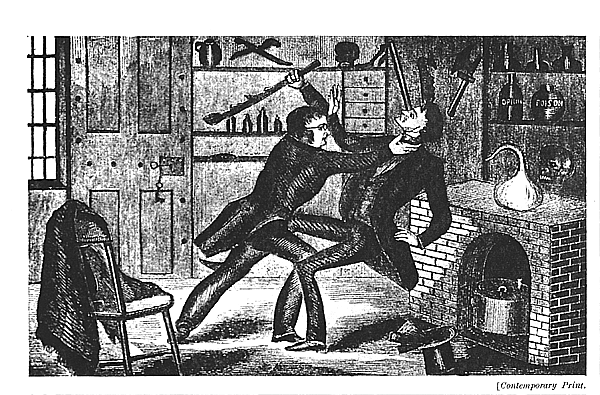Suggestions:
-Schama appears unequivocal in his judgment, p. 274: "A year before he killed George Parkman ..." How reliable is the story of the noose? When was it told? Who told it? What do you think of the device of the joke followed by the April Fools Day sentencing as devices to bring closure to the Webster saga? (p.274)
-how does the press respond to the sentence according to Schama? Who to them is the victim & who is the villain?
-how does Schama handle Dr. Putnam and the confession Putnam alone hears and alone presents?, p. 181
Schama returns to the mind of Governor Brigg, petitions to him converning the Webster case.
-at last enters the mind of Webster, convey a sense that Webster knew he was guilty and thought himself mad at the time: a moment of 'ebullition', or boiling over. (p. 297)
-August 30, 1850: execution- burial by Ned Sohier, defense lawyer's son. Reference to Littlefield? Meant to cast doubt? Amelia Hickling Nye's letter that states that in his very last letter to his family "he made no further confession?" (p. 302). Who was Amelia? (see p. 324).
-Just how wealthy were the Websters? (pp. 304-306)
- Does Schama become so carried away with this literary style that he stumbles on p. 307? Did he not mean to say "Watches were replaced by Professional Policemen"? Does this indicate a passion for style at the expense of accuracy? (p.307).
-Was Webster 'improvident' as implied on p. 310?
-any interesting revelations in the short biographical sketches? Are you surprised to know that there was a George Parkman Jr.? (p. 313)
-of what importance are Schama's final remuninations about two houses (one in the Azores and one in Boston) and his quoting of two letters by Briggs to his daughter? (for a hint, see pp. 321-322)
-who has been left out of the notes and, in your opinion, why?
-Schama's view of his own work:
-suggests in closing that historians cannot transport themselves as Henry James the novelist's character did, to the past through an open portal, but can still reconstruct in narrative form his or her own understanding of the past in a style that need not be burdened by excessive documentation and debilitating qualifications. Historians, in other words, must first be excellent story tellers, and second, careful accounters of the knowable 'facts.' On that score, how well does Schama do?

Source: Contemporary print reproduced in the Trial of Professor John White Webster, (New York: Charles Scribner's Sons, 1928), p. 32.
Phone: (o) 410-260-6401
Email: edp@mdsa.net